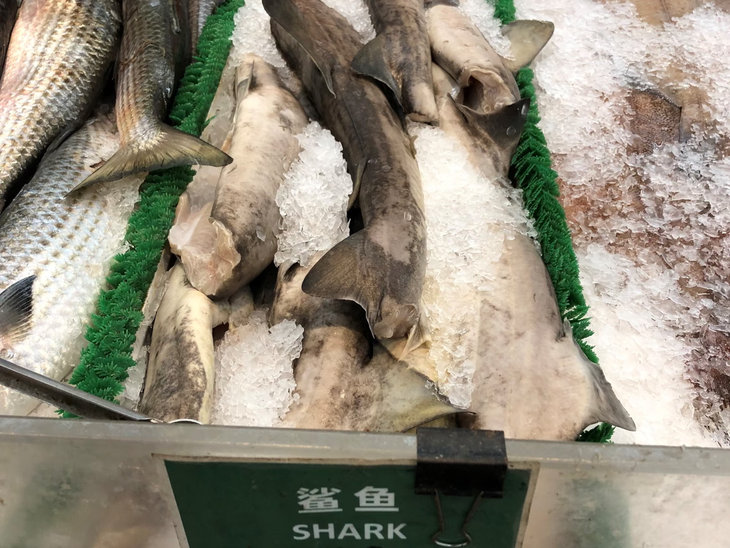
A store in the US only labels its products with a generic "shark" label - Photo: GUARDIAN
According to the Guardian on September 12, most shark meat sold in the US is mislabeled, many of which come from endangered species.
The study, conducted by the University of North Carolina at Chapel Hill, tested products from supermarkets, seafood markets and online retailers.
The results showed that 93% of the samples were mislabeled or labeled so vaguely that the buyer had no idea what species of shark they were consuming. Only one product was correctly labeled with the specific species.
"The purpose of this study was to clearly identify shark meat products sold in the United States," said marine ecologist Savannah Ryburn, who led the study.
More specifically, the team purchased and analyzed the DNA of 29 shark meat products from supermarkets, seafood markets, and online stores in the US to accurately determine the species' identity.
DNA analysis revealed meat from 11 different shark species, including the great hammerhead shark and the scalloped hammerhead shark, both of which are listed as critically endangered by the International Union for Conservation of Nature (IUCN).
However, these species are still available on the US market with prices starting from only 2.99 USD/pound (about 6.59 USD/kg).
The study, published in the journal Frontiers in Marine Science , found that 27 of the 29 samples tested were sold simply as “shark” or “mako shark”. The remaining two products listed the species name, but one was misidentified.
“Misleading or ambiguous labeling leaves consumers unable to make informed choices about what they put into their bodies,” warns Ms Ryburn.
“In our study, scalloped hammerhead and great hammerhead sharks were generically labeled as ‘shark’, when these two species are not recommended for consumption due to their very high levels of contaminants. Without accurate labeling, it is difficult for consumers to avoid purchasing these products,” she added.
Health risks of eating shark meat
In addition to conservation issues, the study also warns of health risks, as shark meat contains high levels of mercury, which is especially dangerous for children and pregnant women.
“Shark meat contains high levels of mercury, highlighting the serious impact mislabeling in the seafood industry has on human health,” Ryburn said. “The fact that shark meat is appearing in US supermarkets is surprising given the serious decline in shark populations globally.”
Shark numbers in the ocean have declined by more than 70% since 1970, largely due to growing demand for their meat.
In addition, the widespread use of shark products in everyday life - from animal feed to cosmetics - also contributes to the species being overfished globally.
Source: https://tuoitre.vn/93-thit-ca-map-ban-tai-my-bi-dan-nhan-sai-sieu-thi-ban-ca-loai-nguy-cap-20250913102324161.htm




![[Photo] National Assembly Chairman Tran Thanh Man chairs the 8th Conference of full-time National Assembly deputies](https://vphoto.vietnam.vn/thumb/1200x675/vietnam/resource/IMAGE/2025/9/29/2c21459bc38d44ffaacd679ab9a0477c)
![[Photo] Many streets in Hanoi were flooded due to the effects of storm Bualoi](https://vphoto.vietnam.vn/thumb/1200x675/vietnam/resource/IMAGE/2025/9/29/18b658aa0fa2495c927ade4bbe0096df)
![[Photo] General Secretary To Lam attends the ceremony to celebrate the 80th anniversary of the post and telecommunications sector and the 66th anniversary of the science and technology sector.](https://vphoto.vietnam.vn/thumb/1200x675/vietnam/resource/IMAGE/2025/9/29/8e86b39b8fe44121a2b14a031f4cef46)
![[Photo] General Secretary To Lam receives US Ambassador to Vietnam Marc Knapper](https://vphoto.vietnam.vn/thumb/1200x675/vietnam/resource/IMAGE/2025/9/29/c8fd0761aa184da7814aee57d87c49b3)































































































Comment (0)